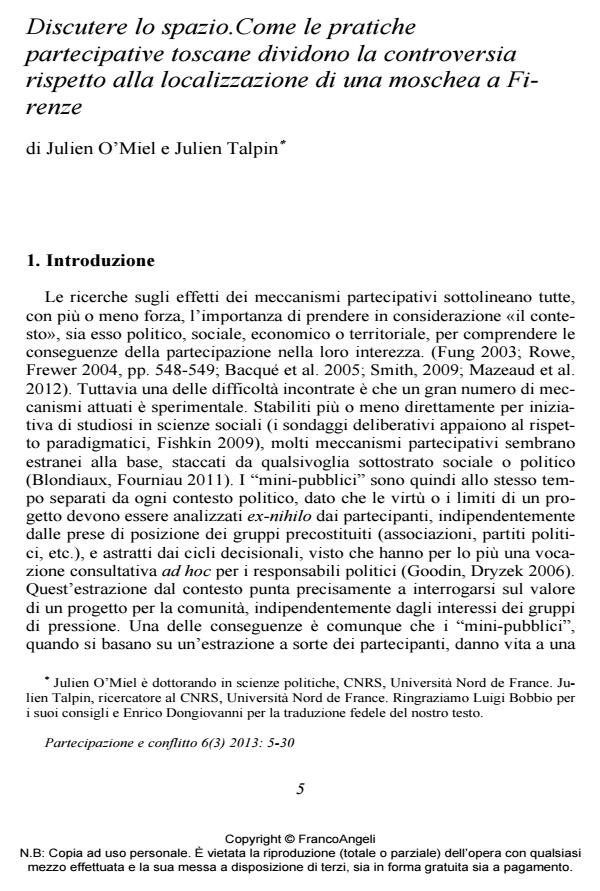Discutere lo spazio.Come le pratiche partecipative toscane dividono la controversia rispetto alla localizzazione di una moschea a Firenze
Titolo Rivista PARTECIPAZIONE E CONFLITTO
Autori/Curatori Julien O'Miel, Julien Talpin
Anno di pubblicazione 2013 Fascicolo 2013/3
Lingua Italiano Numero pagine 25 P. 5-29 Dimensione file 321 KB
DOI 10.3280/PACO2013-003001
Il DOI è il codice a barre della proprietà intellettuale: per saperne di più
clicca qui
Qui sotto puoi vedere in anteprima la prima pagina di questo articolo.
Se questo articolo ti interessa, lo puoi acquistare (e scaricare in formato pdf) seguendo le facili indicazioni per acquistare il download credit. Acquista Download Credits per scaricare questo Articolo in formato PDF

FrancoAngeli è membro della Publishers International Linking Association, Inc (PILA), associazione indipendente e non profit per facilitare (attraverso i servizi tecnologici implementati da CrossRef.org) l’accesso degli studiosi ai contenuti digitali nelle pubblicazioni professionali e scientifiche.
While participatory democracy is often presented as a means for public authorities to channel conflict in setting up top-down deliberative initiatives, the study of a bottom-up participatory process offers a much complex picture, shedding a new light on the articulation between participation and conflict in the public sphere. The paper presents the results of an ethnographic study of a participatory process that took place in Florence in 2011-2012 at the request of the Muslim community of the city, using a disposition of the Regional law for participation. As a matter of fact, deliberation managed to bring down the tensions around the project of construction of a mosque that could have, as it happened in many other European cities, resulted in a harsh conflict over the symbolic appropriation of the territory. It worked so well that the absence of conflict resulted in very limited participation and discussion in the local public sphere, failing to create a shared legitimate output such as the localization of the future religious center. Despite such failure, the participatory process also fostered the empowerment of the Florentine Muslim community that witnessed the emergence of new leaders and a broader public recognition of its civic status in the city. This indirect outcome of the process could constitute a crucial resource for the future battles over the construction of the mosque. This study therefore confirms the need to study together the policy, the politics and the microfoundations of participatory democracy to understand fully its consequences. Only when all these elements are analyzed together can the effects of participation be adequately understood.
Parole chiave:Particpation; public space; contentious politics; local government
- Religion and local politics in Southern Europe: a research agenda Alberta Giorgi, Xabier Itçaina, in Religion, State and Society /2016 pp.276
DOI: 10.1080/09637494.2016.1212588 - Special section: religion and territorial politics in southern Europe Alberta Giorgi, Xabier Itçaina, in Religion, State and Society /2015 pp.114
DOI: 10.1080/09637494.2015.1064224 - L’islam et la cité pp.257 (ISBN:9782757416389)
- Islam as a new social actor in Italian cities: mosque controversies as sites of inclusion and separation Bartolomeo Conti, in Religion, State and Society /2016 pp.238
DOI: 10.1080/09637494.2016.1220770 - S’approprier l’espace public. Les musulmans en Italie, de la marginalisation à la citoyenneté Bartolomeo Conti, in Les Cahiers d’EMAM /2016
DOI: 10.4000/emam.1237
Julien O'Miel, Julien Talpin, Discutere lo spazio.Come le pratiche partecipative toscane dividono la controversia rispetto alla localizzazione di una moschea a Firenze in "PARTECIPAZIONE E CONFLITTO" 3/2013, pp 5-29, DOI: 10.3280/PACO2013-003001